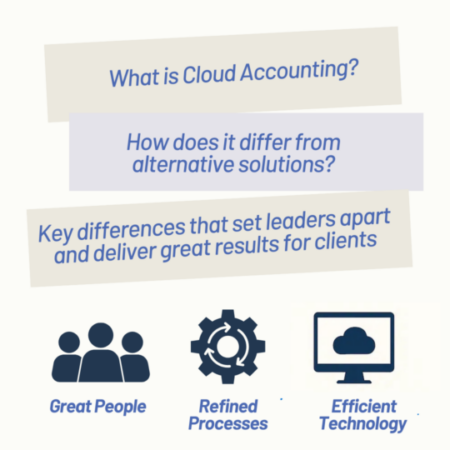Keys to Success with Cloud Accounting – Part 1: What is Cloud Accounting and How Does it Compare to Alternative Solutions

Since the emergence of tools like Bill.com in 2008, cloud accounting success has become a sought-after goal for growing businesses. Many firms now offer outsourced bookkeeping and accounting services using SaaS platforms and call themselves “cloud accounting providers.” But does using QuickBooks Online and a remote team automatically guarantee cloud accounting success? Not quite.
True cloud accounting success involves much more than remote access and monthly reconciliations. It’s about building a scalable, integrated financial system that delivers real-time insights, increases efficiency, and supports strategic decision-making. Unfortunately, many firms fall short. They provide the basics—bank feeds, invoice management, and simple reporting—but lack the expertise to help clients scale, plan, or stay audit-ready.
Cloud accounting success requires the right technology, experienced staff, and streamlined workflows. It’s not just about moving your books to the cloud—it’s about rethinking how accounting can support growth. For example, using tools like Bill.com, QuickBooks Online, and integrated dashboards, a well-structured cloud accounting setup can reduce manual data entry by 80%, shorten your month-end close cycle, and give business owners real-time visibility into key financial metrics.
However, it’s important to recognize the limitations. Some firms overpromise and underdeliver. They call themselves “cloud experts” but can’t provide consistent reporting or adapt to your industry’s needs. In reality, anyone can plug into QuickBooks and send a P&L—few can guide your business to true financial clarity and operational efficiency.
You also need to consider alternatives. Should you hire an in-house bookkeeper? Build a hybrid finance team? Or outsource to a trusted cloud accounting partner with proven processes?
Each path has trade-offs. In-house hires bring control but can be expensive. Hybrid setups offer flexibility but require strong coordination. Outsourcing offers expertise and cost efficiency—if you pick the right firm.
In this guide, we’ll explore what makes a cloud accounting partner truly effective and how to avoid common pitfalls. Whether you’re a startup or a scaling company, understanding what cloud accounting success looks like can save time, money, and future headaches.
Download the guide to learn how to set up a reliable, scalable, and high-impact accounting system in the cloud.